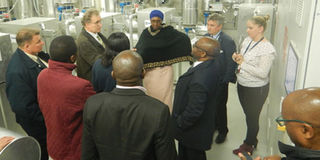Tanzania seeks to learn from Poland’s investment in water

Permanent secretary in the ministry of Water, Prof Kitila Mkumbo (in spectacles right), the hosts and members of his delegation listen to a briefing on production of electricity and heat from sewage at a water park in Tychy, Poland. PHOTO | TYCHY WATER PARK
What you need to know:
- Tanzania has much to learn from Poland on investment and operation of water and sewage infrastructure and energy generation from waste, the Permanent Secretary in the Ministry of Water, Prof Kitila Mkumbo said during a recent study visit to the European country.
Warsaw. Tanzania has much to learn from Poland on investment and operation of water and sewage infrastructure and energy generation from waste, the permanent secretary in the ministry of Water, Prof Kitila Mkumbo, said during a recent study visit to the European country.
The PS was impressed by Poland’s water and waste management model, and how the country recovers energy from sewage and solid waste and its processing into electricity and heat.
“Tanzania is urbanising fast and we need these kinds of technologies to serve the increasing numbers. We should adopt and adapt some of the technologies,” Prof Mkumbo said during a visit to Krakow Municipal Water and Sewage Company.
He said that though there were a number of achievements in the water sector in Tanzania, the country had so far not been able to supply (and treat) water to all its people, and effectively deal with sewage and solid waste.
Areas visited by the PS and his entourage included Krakow Water and Sewage Company, Plaszow Sewage Treatment Plant and Thermal Waste Transformation Plant, Warsaw Municipal Water Supply and Sewage Company and some academic institutions.
In each wastewater treatment plant the delegation visited, there was a component of producing biogas or renewable energy that is used for various purposes, including generating electricity and heating homes. Prof Mkumbo was of the view that such kind of technology could be adopted by Tanzanian water utilities to modernise their treatment plants to generate their own electricity to run their plants (wastewater and water supply).
“We have a problem in Tanzania and Africa in general in dealing with waste water. And this is not only about waste management. One of the struggles we have with our water utilities is that they cannot afford the cost of energy (renewable energy). We need to learn from Poland that it is possible to generate energy from water and sewage systems,” Prof Mkumbo said.
At Tychy, the team saw how wastewater collected in the town and neighbouring areas is used to produce biogas and generate electricity and heating for a huge water park. The facility, which also runs educational programmes for the community on water and energy, produces surplus electricity that is sold for running commuter buses and other services.
At another location, the team observed an eco-incinerator that processes 220,000 tonnes of municipal waste in a year. Approximately 65,000 MWh of electricity and 280,000 MWh of heat are produced at the KHK plant as a result of the combustion, part of which is used by the company and surplus sold to a power utility company.
At the Krakow University of Science and Technology, there was a demonstration on the application of technology in monitoring levels of water quality and quantity in water wells by using installed cameras in submersible pumps and on how centrally produced power and heat can be supplemented by small producers, stored and transported (heat) without using pipes.
In Jaworzno city, the delegation observed water purification technology using reverse osmosis and ozone technologies instead of using chlorine as commonly done in Tanzania. Reverse osmosis is a water purification technology that uses a semipermeable membrane to remove ions, molecules and larger particles from drinking water. Drinking water treatment using ozone removes iron, manganese, taste, odors and sulfur without adding chemicals.
Other areas visited by the delegation were Krakow Municipal Water and Sewage Company, Plaszow Sewage Treatment Plant and Warsaw municipal water supply and Sewage Company.
The objective of the study visit was to get first-hand experience of practices and relations among policy, institutions and technology in the water sector in Poland.
Prof Mkumbo was accompanied by the Director of Programme Coordination Unit, ministry of Water Ms Dorisia Mulashani, Director of Water Quality, ministry of Water, Ms Nadhifa Kemikimba, Senior Environmental Engineer, Department of Water Resources, Ministry of Water Mr Peter Kishiwa, Senior Economist, Department of Policy and Planning, ministry of Water Mr Enock Wagalla.




